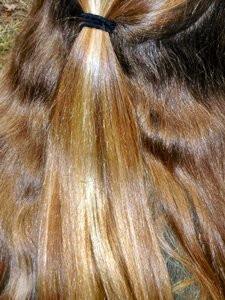Wintry weather can have a damaging effect on hair and skin as the cold keeps people inside and stops us from getting the fresh air and exercise that we need. It will be a few more months before we can enjoy going outdoors again but in the meantime, altering your diet can have a huge effect on your appearance, and keep your teeth, skin and hair looking healthy.
By watching which minerals and vitamins you take in with the foods you are eating, you are nourishing your hair and skin. For example, dairy products and dried apricots contain Vitamin A, which replenishes the skin cells. Nuts and oily fish maintain healthy hair as they contain fatty acids. It is also important to consume zinc, either from red meat or other supplements, to avoid skin becoming overly dry.
How To Get Glowing Skin By Eating Healthy

- Skin will benefit from vegetables and fresh fruit, as they contain an antioxidant called beta carotene, which keeps skin healthy by destroying damaging chemicals. The best sources of beta-carotene are carrots and broccoli.
- Avoiding skin conditions such as dermatitis and eczema can be done through intake of fatty acids. If you cannot get these by eating fish, fish oil supplements or primrose oil can be used instead.
Even wrinkles can be tackled by watching your diet. Deficiency in vitamins A, C and E as well as zinc and selenium is what causes wrinkles and lines.
- Getting enough Vitamin C will allow the body to build collagen, which prevents sagging. The best sources of vitamin C are citrus fruits, blackcurrants, red peppers and kiwi fruits.
- Foods such as sunflower seeds, spinach, watercress and olive oil contain vitamin E, which helps combat wrinkles and acne scars by helping the body heal with its antioxidant properties. It also helps nutrients and oxygen reach the surface of the skin by keeping red blood cells strong and healthy.
- Selenium also works as an antioxidant and aids the body as it processes food. It can be found in wholegrain bread, eggs and Brazil nuts.
How To Get Shiny, Healthy Hair
Consuming the right nutrients helps hair to thrive by making the follicles stronger.The best way to keep shiny, healthy hair is to eat a balanced and varied diet with plenty of protein. The best foods to eat in order to give your hair that bit of extra care and attention include the following:
- Oily fish, such as salmon, mackerel and trout contain protein, vitamin D and fatty acids. These fatty acids are essential to allow your body to grow hair and keep the scalp hydrated.
- Eggs, as well as containing protein, zinc and selenium, are a great source of iron. This is vital as iron deficiency can cause hair loss if not enough oxygen gets to the hair follicles.
- Walnuts are rich in fatty acids as well as vitamin E and biotin, which helps prevent hair loss and protect cells. They also contain copper, which helps the hair retain a rich colour.
- Sweet potatoes sustain the scalp by producing and protecting natural oils.
- Oysters are a great source of zinc, which also helps stop hair loss, as well as containing a good amount of protein. If the body does not get enough protein, it will not be able to replace hair naturally.

The Right Diet Can Keep Your Teeth Healthy
 Eating the wrong sorts of foods can lead to tooth decay, which can lead to all sorts of other problems so it is crucial for good oral health that you eat a healthy and balanced diet. This includes eating enough fruit and vegetables, foods rich in starch such as potatoes, bread, rice and pasta, sources of protein including eggs, meat, fish and lentils, as well as dairy products.
Eating the wrong sorts of foods can lead to tooth decay, which can lead to all sorts of other problems so it is crucial for good oral health that you eat a healthy and balanced diet. This includes eating enough fruit and vegetables, foods rich in starch such as potatoes, bread, rice and pasta, sources of protein including eggs, meat, fish and lentils, as well as dairy products.
Food can surprisingly help keep your teeth clean. By snacking on fruit like apples, you clean your teeth by scraping plaque off them. Calcium is very important for teeth, so eating food, like cheese, dried herbs, yoghurt and milk will benefit your teeth.
Foods to avoid, or limit your intake of, are those that are high in sugar, including:-
- Chocolates, cakes and sweets
- Added sugar in tea and other hot drinks
- Honey, jam and marmalade
- Sugary drinks
- Ice cream
- Breakfast cereals with high levels of sugar
Author Bio: Anna is an experienced writer who specialises in healthy eating. She wrote this article on behalf of www.britishdentistry.org.uk

